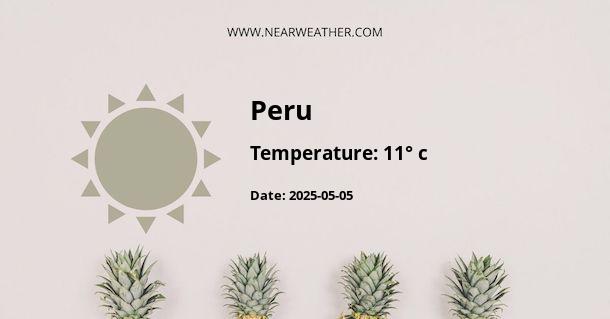Climate and Weather in the Republic of Peru
Peru, a country in South America, is known for its diverse climate and weather patterns due to its varied geography. From the arid deserts along the coast to the Andean mountain ranges and the lush Amazon rainforest, Peru experiences a wide range of climatic conditions throughout the year. Understanding the nuanced weather patterns in Peru can help travelers and residents prepare for their experiences in this beautiful country.
Coastal Region
The coastal region of Peru experiences a desert climate with mild temperatures and very little rainfall. The capital city of Lima, located along the coast, is known for its persistent gray overcast skies, particularly during the winter months from June to September. The average annual temperature in Lima hovers around 66°F (19°C), with minimal temperature fluctuations throughout the year. The lack of rainfall in this region contributes to its arid climate, making it one of the driest inhabited places on earth.
| Month | High (°F) | Low (°F) | Rainfall (inches) |
|---|---|---|---|
| January | 78 | 66 | 0.01 |
| April | 76 | 65 | 0.01 |
| July | 64 | 59 | 0.00 |
| October | 67 | 59 | 0.00 |
Andean Highlands
As one moves inland towards the Andean highlands, the climate in Peru shifts to cooler temperatures and more pronounced seasonal variations. Cities like Cusco, a popular tourist destination and the historic capital of the Inca Empire, experience a subtropical highland climate. The days are generally warm, but nights can be quite chilly, especially during the dry season from May to October. In the higher elevations, temperatures can drop below freezing, and mountain peaks are snow-capped year-round.
"The Andean highlands offer a unique climate with cool temperatures, significant daily temperature swings, and the potential for high altitude effects such as altitude sickness." - Dr. Maria Lopez, Climate Scientist
Amazon Rainforest
The Amazon rainforest in eastern Peru has a tropical rainforest climate characterized by high temperatures and heavy rainfall throughout the year. The city of Iquitos, located in the heart of the Amazon, experiences consistent heat and humidity, with an average annual temperature of around 80°F (27°C). The wet season from November to April brings intense rainfall and the potential for flooding, while the drier season from May to October offers some relief from the constant deluge.
Climate Variability and El Niño Phenomenon
It's important to note that Peru is also subject to climate variability, particularly the El Niño Southern Oscillation (ENSO) phenomenon, which can significantly impact weather patterns in the region. During an El Niño event, the coastal waters of Peru warm up, leading to heavy rains, flooding, and landslides in the normally arid coastal region. In contrast, the Andean highlands may experience drier conditions during an El Niño event, leading to water shortages and agricultural challenges.
Conclusion
In summary, Peru's diverse geography gives rise to a wide range of climatic conditions, from the arid coast to the high Andean peaks and the steamy Amazon rainforest. Understanding these distinct climatic regions and the potential for variability due to phenomena like El Niño is crucial for anyone planning to visit or live in Peru. By preparing for the unique weather patterns in each region, individuals can make the most of their experiences in this captivating country.
A - Peru's Latitude is -10.000000 & Longitude is -76.000000.
A - Weather in Peru is 13° today.
A - Climate Conditions in Peru shows broken clouds today.
A - Humidity in Peru is 85% today.
A - Wind speed in Peru is 11.38 km/h, flowing at 51° wind direction. today.
